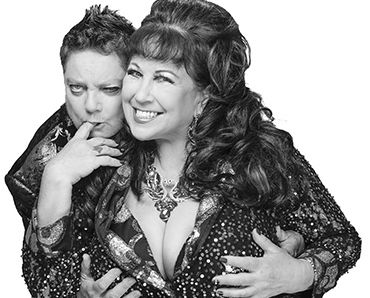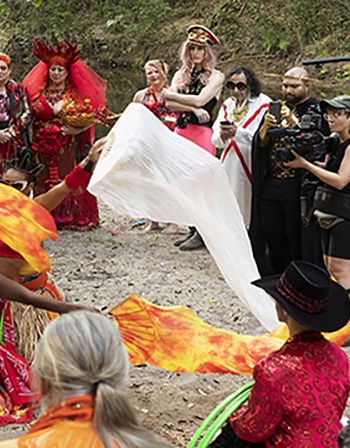Beth Stephens and Annie Sprinkle
Exploring the Earth as Lover: New Approaches to Environmental Art, Theory & Activism
31. 7. – 12. 8. 23
We aim to create a gathering of artists, academics, sex workers, sexologists, healers, environmental activists, media makers, activists, hydrofeminists, educators, (r)evolutionaries, critters and other entities to celebrate, proclaim, challenge, debate, perform, make rituals and delight our senses. Whether you are country folk, city folk, punk, queer, hetero, trans, historian, pagan, scientist, stargazer, skinny dipper, or other worldly being, you are welcome!
Participants will be offered opportunities to explore how imagining the Earth as a lover can shape our lives, our work, bring pleasure and joy, and deepen our relationship with our ecosystem. Students can create new work, share it, and get feedback. We will support each other in pollinating the work around the world to museums, galleries, media, protests and gatherings. We’ll collaborate with nature.
The week will begin with sharing our collective experiences and interests. There will be a daily walk as art, and we'll interact with nature through our senses; smelling, touching, tasting, seeing and hearing. There will be shared meals, film screenings, assignments, performances, and a ritual co-created by the group. By the end of the two weeks, students will have a deeper, more empathetic relationship with the Earth. Students will develop the “ecosexual gaze” and become familiar with the field of environmental art and related theory. Serious environmental concerns will be fuel for our fires. Humour will be encouraged.
key data
- Venue
- Festung Hohensalzburg
- Date
- 31. 7. – 12. 8. 23
- Requirements
- An open mind
- What to bring
- Tools and supplies for your desired creative discipline(s). Sketch pad/book. Various Kinds of Pens. Items for Rituals. Bring a little water from your home region
- Teaching language
- English
- Medium
- Interdisciplinary/Intermedia: Performance Art, Video, Writing. Painting, Drawing, Social Practice Art, Theory, Ritual
Beth Stephens / Annie Sprinkle
In 2002, Beth Stephens and Annie Sprinkle fell in love and have worked together ever since, doing visual art, performance art, theatre, film-making and happenings. They launched the Ecosex Movement (2008) from their home base in San Francisco and have been doing multi-media art experiments that aim to make environmental activism more sexy, fun and diverse. In 2016-17, they were official documenta 14 artists. In 2021 they were awarded the Guggenheim Fellowship in film-making.
Films
2017 Water Makes Us Wet–An Ecosexual Adventure. Feature film co-produced and co-directed with Beth Stephens
2013 Goodbye Gauley Mountain–An Ecosexual Love Story. Feature film co-produced with Beth Stephens
Exhibitions
Featured Artist in Performances, Social Practice and Visual Art Exhibitions
2022 Ecosex Walking Tour, San Francisco Public Library, San Francisco, CA (US), Ecosex Healing Clinic, San Francisco Public Library, San Francisco, CA (US) (Earth Day). 2021 Ecosex Healing Clinic, City Lights, San Francisco, CA (US) (OCT); Cyber Wedding to the Brine Shrimp, Great Salt Lake, (adjacent to Robert Smithson's, Spiral Jetty), in collaboration with Ewelina Jarosz and Justyna Górowska. Rozel Point, Utah (US); Ecosex Walking Tour of the Poudre River, Colorado State University, Fort Collins, CO (US). 2020 Ecosex Clinic, Saitama Triennial, Saitama (JP)
Publications
Publications
Assuming the Ecosexual Position-Earth as Lover. University of Minnesota Press, Minneapolis, MN (Summer, 2021. Independent Female Filmmakers: A Chronicle through Interviews, Profiles, and Manifestos. An interview with Linda Williams. Edited by Michelle Meeks. Focal Press/Routledge, 2019. Field to Palette – Dialogues on Soil and Art in the Anthropocene. Soil Lovers Unite! A conversation with Farmer Philosopher Fred Kirsheman, Annie Sprinkle & Beth Stephens. Edited by Alexandra Toland, Jay Stratton Noller, Gerd Wessolek. Routledge, 2018. Gender: Nature. Ecosexuality. Chapter written in collaboration with Beth Stephens. Edited by Iris van der Tuin. Macmillan, Farmington Hills, MI (US), 2017

